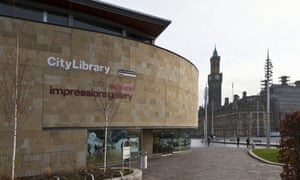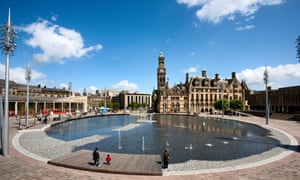
The library at Thebes was said to have the inscription “Medicine for the soul” above its doors – a notion Bradford council is set to put to the test with plans to offset major library cuts with funds from its health and wellbeing budget.
The West Yorkshire council is just one of the local authorities up and down the country which has dealt with shrinking reserves by closing hundreds of libraries. Last year, it proposed chopping £2 million from its libraries spending over two years, a funding reduction of two-thirds. The biggest cut of £1.05m was due to hit at the start of this coming financial year, until the council came up with what could be described as a novel idea.
At a January meeting, a rescue package was proposed — diverting funds from the council’s health and wellbeing budget to reduce the impact of the cuts on libraries. If the decision is ratified by the full meeting of the council’s executive on 4 March, it will mean injecting £700,000 into libraries, dramatically reducing the proposed cuts for the coming financial year and alleviating fears voiced by library campaigners and staff — who took strike action in October in protest against the cuts — that job losses and branch closures would be inevitable.
Not only that, but the proposal on the table is for a recurring annual investment of that amount. If the decision is passed, then it will be a firm commitment and recognition by Bradford that libraries really are medicine for the soul – an inspiration for other authorities who facing savage library cuts.

This week, Bradford Metropolitan District Council announced it was opening a consultation process for residents to give their views on the proposals and was also “exploring wider funding opportunities which would help support ambitions for a sustainable library service which meets the needs of local communities”.
Councillor Susan Hinchcliffe, the leader of Bradford Council who will be presiding over the meeting next month, said the council’s focus “has to be on preventing ill-health in the first place, not dealing with it after the fact. And libraries have a big part to play in that.”
“A huge number of the decisions we have to make at the council are about the health and wellbeing of people,” Hinchcliffe said. “Books are of course hugely important in libraries but there are many other aspects. The social interaction they provide is vital, especially for isolated people. They host clubs and events, they provide information and access to the internet.
“We are remodelling how libraries work to meet the needs of the health agenda. Libraries are symbols of community and we have to be passionate about libraries and how they serve these communities.”
Bradford council’s decision was taken internally, the council confirmed, with no outside experts called in. But according to Dr Ricky Lawton, co-author of a 2015 Arts Council report into libraries and health, the link between libraries and wellbeing is well established.
“We interviewed two large groups, library users and non-users, and library usage was associated with higher levels of happiness and satisfaction,” Lawton said. “What’s often important to councils in these situations is the cultural value of a service … We know libraries are beneficial anecdotally, but with our research we tried to look at how valuable they were in monetary terms, by asking people if they would hypothetically be prepared to pay for the services they receive.”

This was the first time he had heard of a local authority putting funds from health provision into library services, he continued, but “Bradford putting money from its health and wellbeing budget into libraries does seem to suggest they are subscribing to our research”.
Users at Bradford’s City Library tended to agree. “Libraries have tangible benefits for health,” said regular library user Paul Davies, “especially mental health.”
Another regular library user, Frances, who lives in nearby Shipley agreed. “I would say that libraries are definitely good for health and wellbeing,” she said. “Not just in terms of reading and what that gives you, but also the social aspect of visiting a library, especially for people who live on their own.”
A Bradford libraries card holder since the 1970s, she welcomed the initiative: “It’s entirely appropriate to spend money from the health and wellbeing budget on libraries. I see a lot of people using the libraries. Some go in just to borrow books, some go in to use the computers, some go in for a chat with a friendly face.
“If we didn’t have libraries, I think people would be very miserable.”
[“source=theguardian”]



